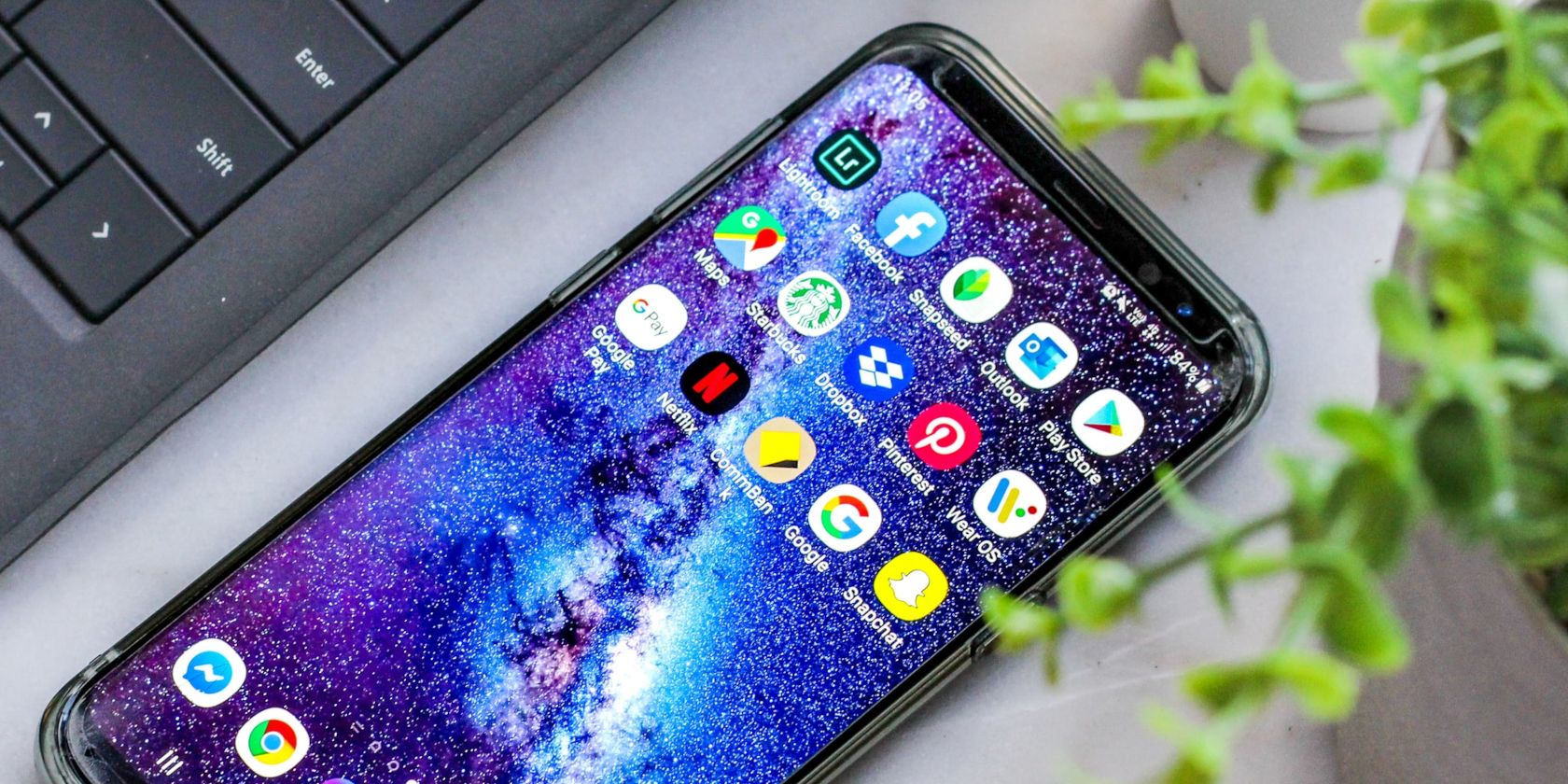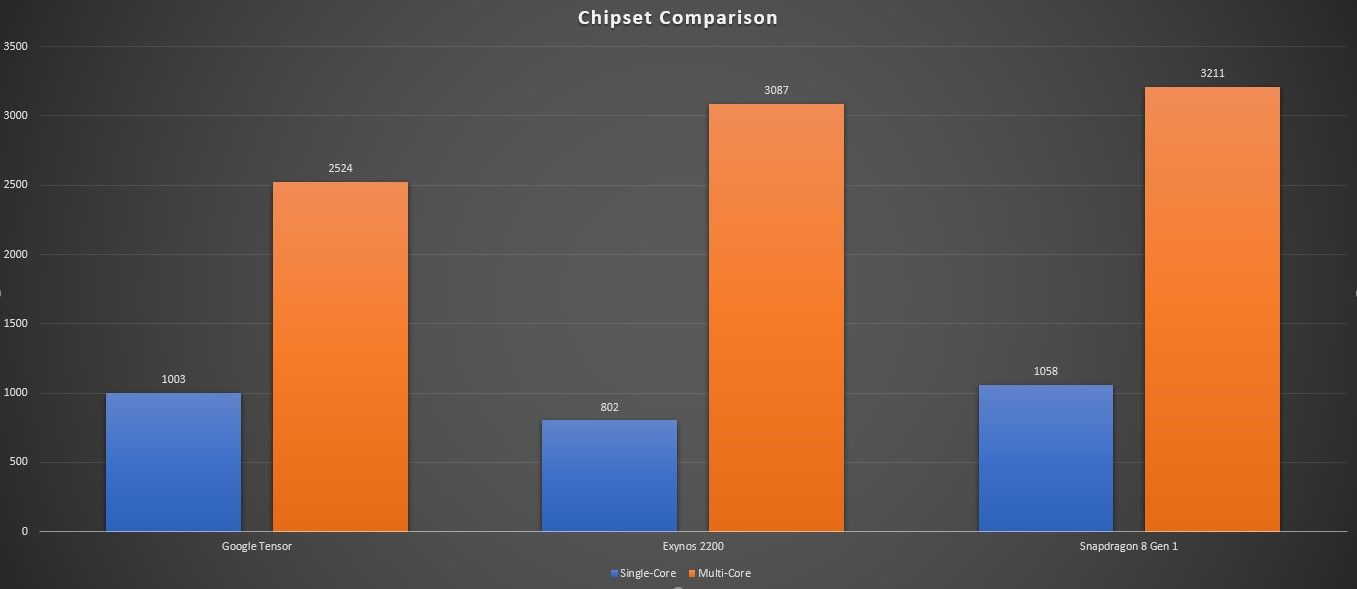Google has officially entered the silicon game. The Google Pixel 6 and Pixel 6 Pro, released by the tail end of 2021, leave Qualcomm chipsets in the past and go instead for an all-new chip, the Google Tensor.
Being Google's first entry into the SoC ecosystem, it definitely has its rough edges. However, it's an excellent first step into a battlefield with rough competition. By launching at the end of last year, though, it needs to put up a pretty much-obligated fight with the two main chips launched at the beginning of 2022—the Snapdragon 8 Gen 1 and the Samsung Exynos 2200.
How do all three chips compare? And should you care about the difference?
Spec Rundown
The Google Tensor was notable because of its curious core configuration. The chipset comes with two ARM Cortex-X1 cores, which are running at 2.85 GHz. Those are accompanied by a middle cluster of two Cortex-A76 cores running at 2.4 GHz and a power-efficient cluster of four Cortex-A55 cores at 1.8 GHz. By contrast, the Snapdragon 888—Qualcomm's main offering in 2021, and a closer comparison to this chip—differed in that it packed one single Cortex-X1 core, but the middle cluster was actually comprised of three Cortex-A78 cores, in a similar 2.4 GHz comparison.
The difference is pretty much a toss-up. On one hand, the Cortex-A76 cores are older and weaker than the Cortex-A78 cores in the 888. But the Tensor does come with two Cortex-X1 cores instead of one, in order to somewhat offset the performance penalty and with some machine learning applications to mind—more on that later.
But in terms of raw specs, the chip pales in comparison to 2022 chips. The Snapdragon 8 Gen 1 has one Cortex-X2 core running at 3 GHz, three Cortex-A710 cores running at 2.5 GHz, and four Cortex-A510 cores running at 1.8 GHz. The Exynos 2200 has a pretty much identical core configuration, and it's clear from looking at the specs alone that both chips will give Google a run for its money.
But there's more than meets the eye.
Google knows its Tensor chip isn't the strongest around, and it never meant it to be. The star of the show is the TPU that's included in the chip. Google is all about that machine-learning and artificial intelligence shenanigans, and this co-processor is able to speed up things like real-time language translation, text-to-speech, and image processing, and more importantly, do it all on-device. This TPU also makes possible the application of Google's HDRNet algorithm to video, which—as Monika Gupta, Senior Director of Google's Silicon team, told Ars Technica—should "bring the Pixel signature look to videos."
We also have the Titan M2 security chip. It's a secure enclave that offers a much-needed extra level of security by storing and processing your sensitive information, such as biometric cryptography, and protecting key processes like secure boot.
It's a different kind of chip for a user that doesn't really care all that much about performance. Still, it should hold ground and not disappoint in the performance department—and at this stage, it's still looking pretty promising. We'll need to look at benchmarks to set the record straight here, though.
Benchmark Rundown
Now, we're going to have a look at some benchmark scores from all three chips. Benchmarks are hardly scientific evidence and don't necessarily reflect real-world performance, but it's still an easy way to get a rough reflection of whether a chip performs better than the other. The difference is actually way less than what you would think based on the spec sheet.
We tested three different devices—a Google Pixel 6 Pro and both a Snapdragon and an Exynos version of the Samsung Galaxy S22 Ultra—on Geekbench. And there are some important takeaways from these results.
Starting with the single-core score. It's consistently lower on the Exynos 2200, but the Google Tensor actually goes toe to toe (mostly) with the Snapdragon 8 Gen 1. We see some difference in multi-core, but the gap is pretty small; the Snapdragon 8 Gen 1 only scores 28% more than the Google Tensor and barely more than the Exynos 2200.
These numbers indicate a handful of things. Yes, both the Exynos 2200 and the Snapdragon 8 Gen 1 are more powerful than the Google Tensor, and if one needs to rise as the winner, that's probably the Snapdragon. They're the most capable chipsets. We should also note here that despite benchmarks, real-world differences between both chipsets can vary wildly—as found by XDA-Developers, you might have a way better experience with the Snapdragon version of the S22 Ultra than with the Exynos version.
But the Google Tensor is not too far behind, only really falling short in the multi-core department, probably because of the better, more modern cores in the most recent chips. We also have to remember that this is Google's first in-house SoC, and it's still in its early stages.
Once we start seeing its successors in the coming years, we'll have to see if it actually gets better. Right now, Google's focus isn't really on performance—but rather to make a capable chip that's superb at machine learning and artificial intelligence stuff. In that regard, the current Google Tensor is amazing—and future chips will likely be, too.
Which Should I Get?
We've reached the point where your choice of chip isn't really as important as it was before. Rather, you'd probably want to get the phone that better suits your needs and look at other specifications.
That being said, if all you want in a phone is raw performance, the Snapdragon 8 Gen 1 might be the option for you. The Exynos 2200 is a close second in benchmarks, but it would probably be smart to wait for Samsung to iron out issues with that one on S22 devices if you really want to hop for one (or if it's your only option).
For machine-learning stuff, the Google Tensor is probably the smarter chip. It's partly the reason why the Pixel 6's camera is so good, and while it might not have the most performance, the Pixel 6 is such a good package that it's hard to pass on.
Snapdragon for Performance, Tensor for Smarts
The Snapdragon 8 Gen 1 (and the Exynos 2200 to a lower degree) is the undisputed performance winner in Android right now. It's a great chip that is capable of smashing through everything you throw at it. But the Google Tensor is not as far behind as you'd think, and it actually comes with some nice tricks up its sleeve.
Hopefully, we've helped you make up your mind.



